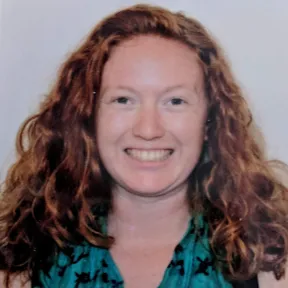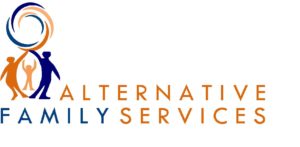Staff in Action: Brittany Ratiani
Brittany Ratiani, LMFT, is one of the amazing staff members here at AFS. Brittany was recently promoted to the role of Clinical Supervisor for our Sonoma County Mental Health Program, and she previously was a Mental Health Rehabilitation Specialist and a Mental Health Clinician here at AFS.

Staff in Action: Brittany Ratiani
Get To Know Brittany
What are your main responsibilities at AFS?
I’ve been in mental health at AFS since I started here in 2016. I’ve spent the past few years as a clinician, providing therapy to our clients and families. Very recently I stepped into the role of Clinical Supervisor and am eager to support our clinicians!
What led you to work in this field?
It was a bit of an accident, really! Back when I was a college student, I was intrigued by trauma, especially how children understood and responded to it. I thought I wanted to research trauma, but quickly learned that I wanted to be with people, not study them. Sharing this realization with folks sowed some seeds of doubt. I heard a lot of “Are you sure you want to do that? It sounds so intense!” So, I resisted working in mental health because I was convinced that it sounded too difficult. I started off working in special education, which I loved. I kept finding myself preoccupied with the students’ mental health needs rather than planning curriculum, like I was supposed to. Several other teachers reflected this back to me, and I realized mental health was my path all along. I wasn’t sure what that would look like, but had ideas about helping families with special needs. I landed at AFS after volunteering at a summer camp for foster children (Royal Family Kids). That first week of camp was like finding the right puzzle piece, something just clicked. I remember telling my partner “This is such a mess, and I can’t figure why exactly I love it, but I do!” Those folks were right, it is intense, but I can’t imagine doing anything else!
Why did you choose to work at AFS?
I landed here through personal connections, and it’s that intentional connection that’s kept me here. I love the work we do, and it’s fueled by how supportive my team is.
What are the three best things about your job?
- My coworkers, truly.
- Working with kids allows me to get silly, playful, and messy. I love that therapy can be a place for kids to process their experience, or to have the experience of being a kid. Each is equally healing, and I love that I get to be part of that experience.
- It’s dynamic! No two days are ever the same.
What are the three toughest things about your job?
- Finding problems is easy, finding solutions is a lot harder. Sometimes there is no solution and we have to just continue wading through murky gray area together.
- Like every therapist before me, and all who will come after, I hate writing progress notes.
- Time management and scheduling. Everyone wants the 3:00 appointment and there’s only so many to go around!
What are three common misconceptions about foster care you would like to address?
- Kids who enter foster care must have terrible parents; all kids in foster care should be adopted by families who can love them better and give them more.
- Foster parents are just in it for the money.
- People in foster care (foster parents, social workers, etc.) are saints. We’re normal people doing really hard things together!
Tell us about one impactful moment you’ve had since working at AFS.
My very first case at AFS completely changed the way I understand family functioning, addiction, and love. I was brand new and naive, and like many others, assumed this birth parent wouldn’t be able to overcome her addiction to successfully reunify with her children. Once an addict, always an addict, right? In a school meeting, the principal was drilling her and she started sharing about the youth’s early life and her own experiences. That moment changed me – I had everything backwards. I was humbled, and honestly embarrassed. Changing my understanding changed the way I saw her, her children, and the whole family. She proved us all wrong and successfully reunified with all of her children. Even if it’s a slim chance that reunification will be successful, doesn’t everyone deserve to have that chance? To have a team supporting them, cheering them on? I think about that family whenever I have a case that seems hopeless. I happened to run into them in the community a few years later – they were all together, all smiling, doing normal family stuff. It brought me so much joy that they didn’t need us anymore. The system did its job, and they were just a family out getting groceries together. What’s more beautiful than just doing life together?
What is an interesting fact about you that others wouldn’t expect?
I love the outdoors! I spend as much time outside as possible and incorporate ecopsychology and nature therapy into my work whenever I can. One of my favorite internships was as a group counselor in a nature therapy practice for children with special needs. When I’m stuck on a case or feeling overwhelmed, I go camping and sleep outside. It always resets my brain and I come back fresh and ready for another day.
Please tell us about a particularly memorable success story!
Success, to me, is whenever a child gets to be a child. One day, I was with a client at a local park. We had just completed a nature scavenger hunt in which I had reflected that she was good at finding things. It didn’t seem too impactful or meaningful to her, so we carried on. We were watching some people fish and I used it as a mindfulness activity. Our conversation drifted to her birth mother, with whom she was working towards reunification. She was so relaxed, watching the fishermen cast their lines, when she suddenly lit up and shouted “I’m good at finding things!” I was a little confused, but joined her in celebrating this discovery. Finally, the connection became clear as she circled back “My mom’s good at finding things, too!” We spent a few minutes finding connections between her and her mom. The whole time, she was so animated and excited – usually she’s very quiet. While I was taking her home, she got quiet again, then said in almost a whisper “Brittany, I think I’m happy. I think I get to be happy now.” Something shifted that day. We returned to that park several times, watching the fishermen cast their lines, letting ourselves be happy.
What’s one piece of advice you would provide to someone just starting out in a similar role?
Trust your wisdom. Don’t let the intensity of the world convince you that you’re small and incapable.
